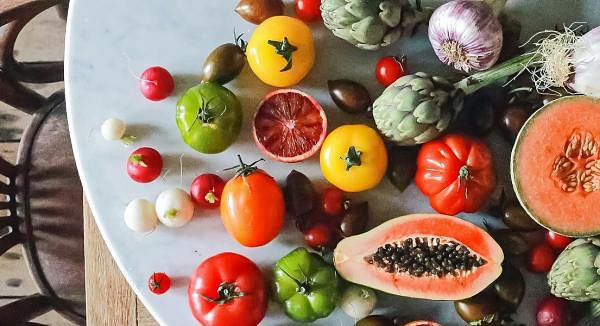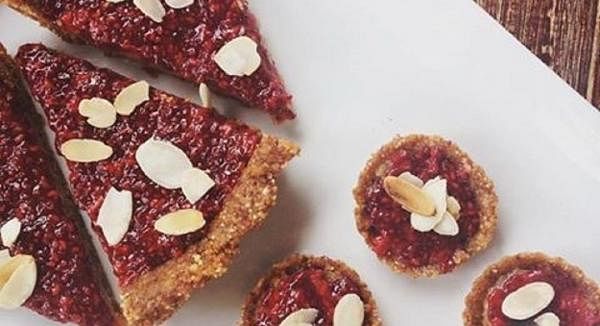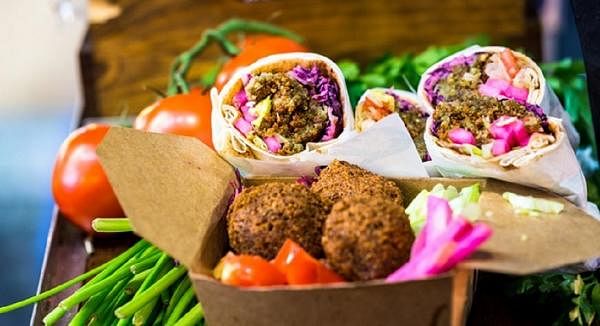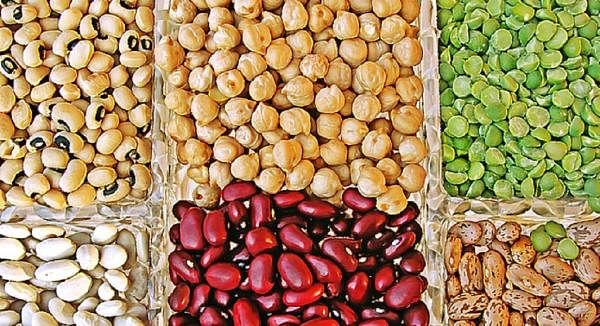Plant Power...Can a Meat-Free Diet Improve Sports Performance
Why you can trust Nutri Advanced Every article on our site is researched thoroughly by our team of highly qualified nutritionists. Find out more about our editorial process.
I’ve long been fascinated by the science of what makes an ‘all-time great’ athlete; the combination of factors that come together to make champions that break world records. And it’s not just one thing; many variables are involved – there’s often a starter culture of natural talent or genetic advantage, along with mental strength and resilience, a gruelling training regime, key lifestyle features such as plenty of sleep and stress management, and last but not least, attention to detail when it comes to diet and nutrition. These factors all have a part to play. And what usually happens when someone excels is that they have managed to do all of these things well.
How diet and nutrition affect performance is particularly intriguing. And there’s a huge body of scientific research on this subject out there. What’s surprising though is how limited the research is when it comes to athletic performance and vegetarian / vegan diets.1-5
In a 2016 review of 8 studies comparing vegetarian and omnivorous nutrition and physical performance found no significant differences overall, however the researchers acknowledged limitations of this small-scale review and concluded that further research is needed6.
Another study on the subject was carried out at Arizona State University. Researchers tracked maximal oxygen uptake (V02 max) on a treadmill and strength in leg extensions in 27 vegetarian and 43 omnivore elite adult endurance athletes. They found that a vegetarian diet may adequately support strength and cardiorespiratory fitness development, and may even be advantageous for supporting cardiorespiratory fitness. They also found that vegetarian women had better results in strength and V02 tests, whilst for men there was no significant difference between the vegetarian and non-vegetarian subjects7.
The researchers concluded that the gender difference is intriguing and merits further investigation; and they have also called for further large-scale trials in this area.
Whilst the research is sketchy, inconclusive and a bit lacking, what’s difficult to ignore is the long list of hugely successful athletes who choose to follow a vegetarian or vegan diet and consider this to be an important part of their success.
Here are just a few examples:
Carl Lewis - World dominant sprinter and long jumper between 1981 and the early 1990s, Carl Lewis delivered his best ever performances at the 1991 World Championships and credits these achievements with switching to a vegan diet in 1990. Following these championships many referred to Carl Lewis as ‘the greatest athlete of all time’. He said, “I’ve found that a person does not need protein from meat to be a successful athlete. In fact, my best year of track competition was the first year I ate a vegan diet.”
Venus and Serena Williams – Tennis superstar sisters with an unprecedented number of grand slam titles between them, Venus & Serena both eat a mainly vegan diet. Venus Williams changed her diet in 2011 after being diagnosed with the autoimmune disease Sjogrens Syndrome; Serena followed suit to support her sister and adopted the same diet.
Novak Djokovic – World number one tennis player until very recently, Novak Djokovic has long been gluten and dairy free and now follows a plant-based diet. He even opened a vegan restaurant in Monte Carlo in 2016.
Edwin Moses - Twice Olympic 400m hurdles gold medallist, Ed Moses was a vegetarian and famously dominated the event for over a decade. He won a staggering 122 successive races between 1977 and 1987, and broke 4 world records along the way!
Scott Jurek – Widely considered to be the most successful ultra-marathon runner of his generation, Scott Jurek’s recent speed record at the 2200 mile Appalachian Trail was fuelled by a plant-based diet. He completed it in 46 days, 8 hours and 7 minutes. He converted to a plant-based diet early on in his ultra-running career despite many saying he would never be able to consume enough protein from plants to support his training and races. He said, “I felt better than I had ever felt before. I had always had pretty good endurance, but now the soreness I had always experienced after long runs was gone. The resting times I had always needed between long workouts was shorter than ever. I felt lighter. I felt stronger. I felt faster. And I felt as young as ever.”
Martina Navratilova – Described by another tennis great, Billie Jean King as ‘the greatest singles, doubles and mixed doubles player who’s ever lived’, female tennis superstar Martina Navratilova follows a vegetarian diet.
Greg Chappell – Former Australian cricket captain, Greg Chappell is considered one of the best all round cricketers of all time. He’s a passionate vegan and has written two books on the subject. He says giving up meat and dairy products made him feel ‘stronger and healthier’.
Mac Danzig – US mixed martial arts fighter who won the titles of MMA National Champion, Gladiator Challenge Champion, King of the Cage and Ultimate Fighter is a proud vegan. He said, “when I decided to go vegan, I was able to make the 155 pound weight class much easier, and I haven’t lost an ounce of muscle. I’m leaner than I used to be, and I have much more energy than I used to.”
Bill Pearl – Bodybuilding champion who held the title of Mr Universe an impressive 4 times and long considered to be one of the strongest bodybuilders ever. Bill Pearl said, “I’m more healthy, I can train with more energy…. I have now been vegetarian for 20 years. Anything you can find in a piece of meat, you can find in other foods as well”.
More anecdotal evidence comes in the form of the typical diet of Kenyan athletes who have dominated long distance running events for many years. In 2011, researchers from the University of Glasgow found that whilst not strictly vegetarian, the diets of elite Kenyan athletes contain very little meat. Their research was published in the Journal of the International Society of Sports Nutrition and found that vegetable sources accounted for approximately 88% of their total energy intake compared to around 50% total daily carbohydrate intake of elite runners in Australia, the Netherlands and the US. A typical Kenyan meal consists of corn meal porridge ‘ugali’, collard greens ‘sukuma wiki’, stewed mung beans ‘ndengu’ and ‘chapati’, a wheat flour tortilla-style bread8.
It’s a fascinating area and clearly warrants more large-scale studies to understand properly how a plant-powered diet may affect sports performance. As we wait for the scientific research, here’s some thoughts on how a plant-powered diet may influence sports performance:
1) High carbohydrates – It’s already well established that a high carb diet confers an advantage in training and competition, and vegetarian or vegan diets typically deliver higher amounts of this macronutrient9
2) High antioxidants & bioactive plant compounds– A vegetarian or vegan diet may also be higher in powerful antioxidant nutrients and bioactive compounds, which are found in a rich supply in plant foods. Increased physical activity, and especially at the intense levels practiced by elite athletes, has the knock on effect of increasing the production of potentially harmful compounds called free radicals. An excessive production of free radicals, or lack of protection against them has been linked to cell and mitochondria (energy producing powerhouse within the cell) membrane damage and lowered immune function10-13. Free radical production may also be increased following injury. Antioxidant nutrients and bioactive compounds (such as sulforaphane found in broccoli) may help to bolster the body’s antioxidant defences against free radicals.
3) Anti-inflammatory – Animal products such as meat and dairy foods tend to increase the body’s production of pro-inflammatory substances called eicosanoids, whilst consumption of some plant foods such as flax and chia seeds support the anti-inflammatory types. Supporting balanced inflammation is key for anyone, and especially those involved in sport.
4) Acid: alkali balance – A diet rich in meat and dairy products tends to be more acid-forming whereas fruits and vegetables help to alkalise the system. An overly acidic diet is bad news for anyone, and perhaps even more so for athletes – low-grade acidosis has been linked to chronic disease and muscle wasting13, and may even have a negative impact on performance, recovery time and risk of injury too.
5) Glutathione – Often referred to as the master antioxidant, glutathione is a vital substance produced in the body that helps to protect us from free radicals. Glutathione also helps to protect the energy production powerhouse within the cell (mitochondria) from damage by free radicals and toxins such as Persistent Organic Pollutants (POPs)14. What’s interesting is that low-grade acidosis may inhibit the synthesis of glutathione thus reducing its protective potential. Since energy production is a vital process for anyone involved in sport, it is crucial that athletes play close attention to nurturing optimal glutathione levels.
Clearly there’s a lot still to learn about the impact of a vegetarian or vegan diet on sports performance. The current trend among sports men and women to either reduce meat intake or go completely meat free is a fast growing area of sports nutrition and I’m fascinated to watch where this will go. It may take some time for the research to catch up, but in the meantime, increasing intake of plant foods whilst eating a bit less and better quality meat could be useful steps to take. Aside from what research studies or other people say, you will always be the best measure of how effective your diet is at supporting your training and performance. Why not try some of these plant-powered recipes, specially selected to support exercise training and performance, as a starting point point and see how you feel? Who knows, you might just be eating your way to the next Olympics!
References:
1. Snowdon DA, Phillips RL. Does a vegetarian diet reduce the occurrence of diabetes? Am J Public Health 1985; 75: 507-12
2.Levin N, Rattan J et al. Energy intake and body weight in ovo-lacto-vegetarians. J Clin Gastroenterol 1986; 8:451-3
3. Burr ML, Butland BK. Heart disease in British vegetarians. Am J Clin Nutr 1988; 48:830-2
4. Burr ML, Sweetnam PM. Vegetarianism, dietary fibre and mortality. Am J Clin Nutr. 1982; 36:873-7
5. Giovannucci E, Rimm EB et al. Intake of fat, meat and fiber in relation to risk of colon cancer in men. Cancer Res 1994; 54:2390-7
5. Craddock JC, Probst YC et al. ‘Vegetarian and Omnivorous Nutrition – Comparing Physical Performance’. Int J Sport Nutr Exerc Metab. 2016 Jun: 26(3):212-20. doi: 10.1123/ijsnem.2015-0231. Epub 2015 Nov 16
6. Lynch, HM, Wharton CM et al. ‘Cardiorespiratory fitness and peak torque differences between vegetarian and omnivore endurance athletes: a cross-sectional study’. Nutrients 2016, 8(11), 726, doi: 10.3390/nu8110726
7. Beis LY, Willkomm L et al. Food and macronutrient intake of elite Ethiopian distance runners. Journal of the International Society of Sports Nutrition 2011 8:7 DOI: 10.1186/1550-2783-8-7
8. Simonsen JC, Sherman WM et al. Dietary CHO, muscle glycogen, and power output during rowing training. J Appl Physiol 1991; 70: 1500-5
9. Leaf DA, Kleinman MT et al. The effect of exercise intensity on lipid peroxidation. Med Sci Sports Exerc. 1997; 29:1036-9
10. Jacob RA, Burri BJ et al. Oxidative damage and defence. Am J Clin Nutr. 1996; 63:S985-S90
11. Sen CK. Oxidants and antioxidants in exercise. J Appl Physiol 1995;79:675-86
12. Dekkers JC, van Doornen JP et al. The role of antioxidant vitamins and enzymes in the prevention of exercise-induced muscle damage. Sports Med 1996; 21:213-38
13. Minich D & Bland J. Acid-alkaline balance: role in chronic disease and detoxification. Alternative Therapies, Jul/Aug 2007, Vol. 13, No. 4
14. Umeda S, Muta T et al. The D-loop structure of human mtDNA is destabilized directly by 1-methyl-4-phenylpyridinium ion (MPP+), a parkinsonism-causing toxin. Eur J Biochem 2000; 267(1):200-06
Resources:
Eat & Run Scott Jurek
Serve to Win Novak Djokovic
This website and its content is copyright of Nutri Advanced ©. All rights reserved. See our terms & conditions for more detail.
Nutri Advanced has a thorough research process and for any references included, each source is scrutinised beforehand. We aim to use the highest value source where possible, referencing peer-reviewed journals and official guidelines in the first instance before alternatives. You can learn more about how we ensure our content is accurate at time of publication on our editorial policy.
Most Popular Articles
-
7 Surprising Ways To Support Your Magnesium
If you are displaying signs of a magnesium deficiency, here are 7 ways to boost your magnesium levels that are easy to incorporate into your daily life. -
5 Best Vitamin C Supplements Picked By Our Experts
Learn more about the different types of vitamin C, the different benefits you get from different types, and what you get for spending more on a good supplement. -
Top 5 Vitamins For Energy And Tiredness Picked By Our Experts
The 5 best and most important vitamins for energy & tiredness including B vitamin food sources & best supplement forms for energy. -
Benefits of Myo-Inositol for Polycystic Ovary Syndrome (PCOS)
In this research review article, we take a closer look at a lesser-known natural compound called myo-inositol that has been found to have significant potential to improve many of the prevalent features of PCOS. -
Top 10 Reasons to Give Your Kids Omega-3
Read the top 10 reasons that kids should have plenty of Omega-3- an essential fatty acid- including for depression, brain function, sleep & reading/maths skills.










